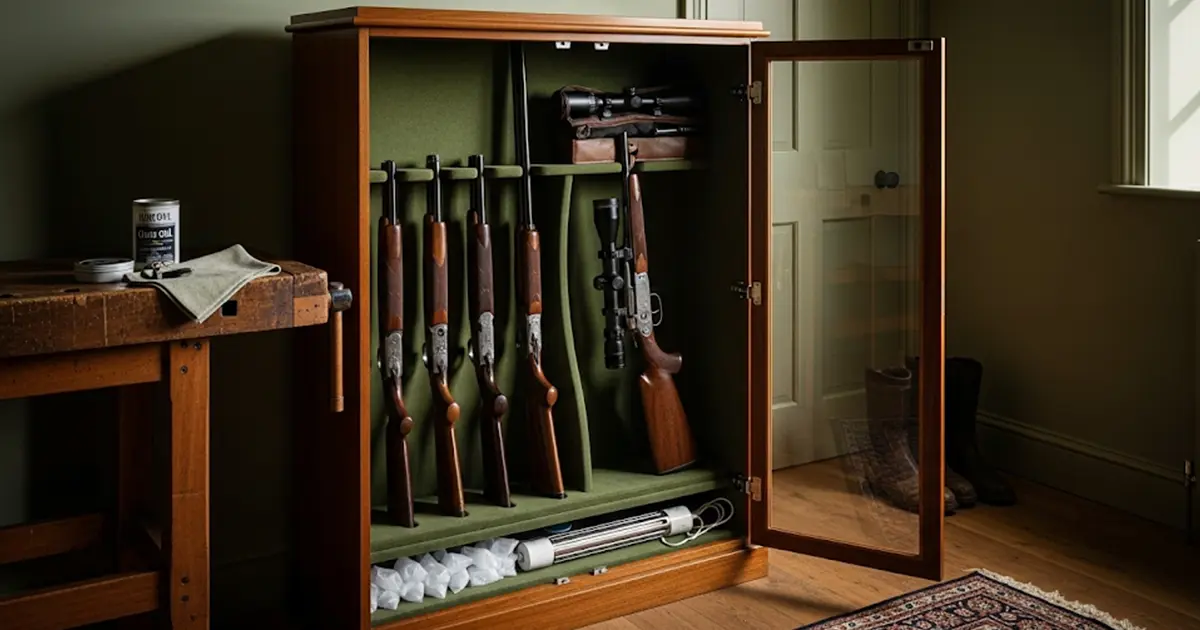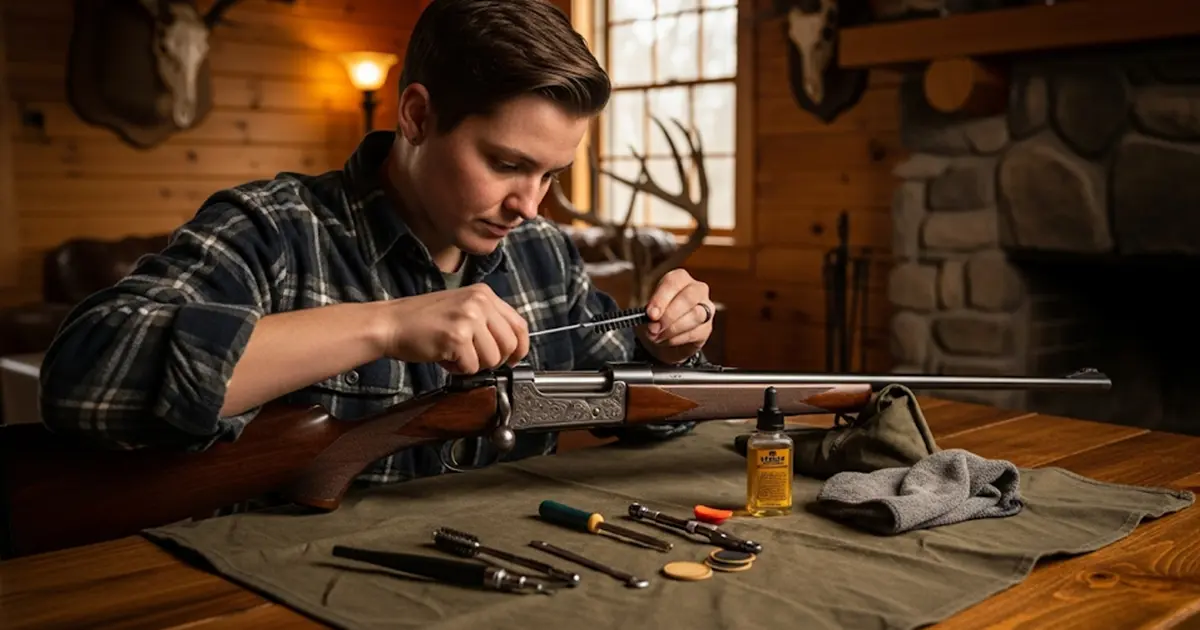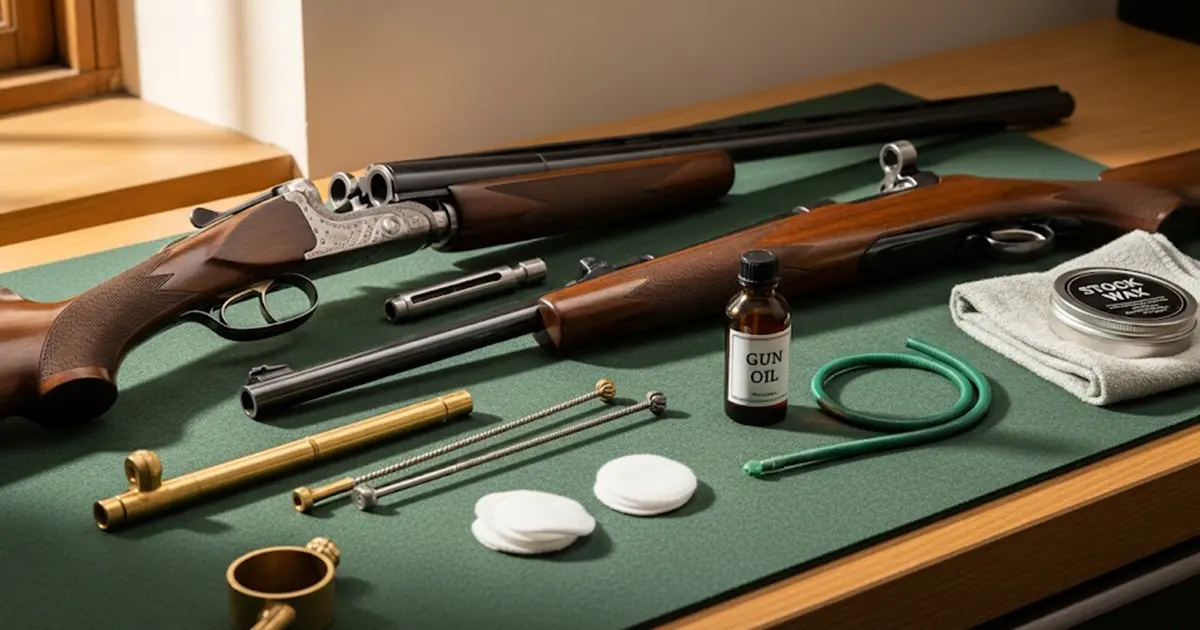Protecting Your Investment Year-Round
Whether it’s a meticulously crafted shotgun for driven game, a centre-fire rifle for stalking, or a black powder revolver for historical shooting, each requires proper care to ensure it performs flawlessly for decades. One of the biggest threats to a firearm’s longevity isn’t use in the field, it’s neglect in storage.
In the UK’s ever-changing and unpredictable climate, improper storage can lead to rust, corrosion, stock warping, and even damage to optics. This guide covers how to store your firearms safely and effectively through every season, with practical advice and insights from David Bellamy, Managing Director of The Instinctive Shooter.
Why Seasonal Storage Matters
“People think that locking a gun in a cabinet is enough,” says David. “But the reality is that seasonal humidity changes, especially in our British winters and damp springs, can wreak havoc on unprotected firearms.”
From September’s warm days to January’s frost and April’s damp chill, each season presents a different set of risks. Understanding them, and taking preventative measures, can save you costly repairs and maintain your firearm’s reliability.
Common Seasonal Storage Mistakes and How to Avoid Them
1. Rust and Corrosion from Moisture
Even in a secure gun cabinet, fluctuating humidity can cause condensation inside barrels and actions. Over time, this leads to pitting and rust.
TIS Tip: Invest in cabinet dehumidifiers, silica gel packs, or a low-wattage heated rod. Check and replace moisture-absorbing products regularly.
Example: One client brought in a beautifully engraved side-by-side shotgun for repair after a season in a damp garage cabinet, the surface rust had set into the scrollwork, requiring costly refinishing.
2. Incorrect Oil or Grease Use
A common debate in forums and among shooters is whether to use light oil, heavy grease, or specialist inhibitors for long-term storage.
TIS Tip: For short-term (weeks), a light gun oil applied sparingly is sufficient. For long-term (months), consider a high-quality corrosion inhibitor or grease, available at The Instinctive Shooter, designed for firearm use. Avoid over-oiling, which can gum up actions over time.
3. Storing Optics Incorrectly
Rifles often sit for months with scopes still attached, trapping moisture in lens caps or causing mount stress.
TIS Tip: Remove optics for extended storage. Store them in a separate, padded, humidity-controlled case. For scopes with fixed mounts, regularly inspect and clean lens surfaces.
4. Stock Warping and Finish Deterioration
Wooden stocks are particularly vulnerable to swelling and shrinking in seasonal humidity, which can lead to cracks or misalignment.
TIS Tip: Apply a quality stock wax or oil before storage. Keep firearms in temperature-stable rooms, away from unheated sheds or lofts.
5. “Out of Sight, Out of Mind” Neglect
Many shooters put their guns away at the end of the season and don’t check them until the next. This can lead to seized chokes, sluggish actions, or corrosion in hidden areas.
TIS Tip: Schedule a quarterly maintenance check. A quick inspection and light clean every few months can prevent nasty surprises.
6. Using Foam-Lined Cases for Long-Term Storage
Foam holds moisture against the metal, a recipe for rust.
TIS Tip: For extended storage, avoid closed foam cases. Instead, use breathable gun socks or soft-lined cabinet racks that allow airflow.
7. Legal Compliance in the UK
Under UK law, firearms must be stored in a secure cabinet that meets Home Office specifications. Long-term absence from home requires notifying your local firearms licensing authority.
TIS Tip: Regularly review your security arrangements. If in doubt, ask for advice, The Instinctive Shooter can provide guidance on compliant storage options.
Practical Seasonal Storage Checklist
Every 3 Months:
- Check moisture levels in your cabinet
- Inspect all metal surfaces for early signs of corrosion
- Lightly oil moving parts
- Rotate silica gel packs or recharge dehumidifiers
Before Long-Term Storage:
- Deep clean barrel, action, and stock
- Apply appropriate oil or corrosion inhibitor
- Remove and store optics separately
- Avoid foam-lined cases
- Store in a stable temperature environment
Product Recommendations from The Instinctive Shooter
At The Instinctive Shooter, we stock:
- Silica gel packs and dehumidifiers for cabinets
- Specialist gun oils and greases for both short and long-term storage
- Stock care products including waxes and oils for wood preservation
- Gun socks and breathable storage covers
- Compliant gun cabinets and accessories
Every product is carefully selected to meet the needs of both casual shooters and professionals, ensuring your firearm is ready to perform the moment you take it out.
Expert Closing Advice
“Seasonal gun storage isn’t about doing everything once and forgetting about it,” David says. “It’s about building a habit. If you care for your firearm consistently, it will look after you when you need it most.”
Whether you’re preparing for next season’s driven shoot, safeguarding a treasured heirloom, or simply ensuring your rifle stays accurate year after year, proper seasonal storage is an investment in performance and safety.
How Do I Stop My Gun From Rusting In Storage?
Rust is usually caused by moisture in the air, even inside a cabinet. Use silica gel packs or a heated rod to control humidity, and always wipe down metal parts with a light coat of quality gun oil before storing.
Is It Bad To Keep A Gun In Its Case Long-Term?
Yes, most foam-lined cases trap moisture against the firearm, accelerating corrosion. For long-term storage, use a breathable gun sock or soft-lined cabinet rack that allows airflow.
Should I Remove My Rifle Scope Before Storage?
If you won’t be using your rifle for several months, it’s best to remove the scope to prevent moisture build-up under the mounts and to reduce strain on the fittings. Store optics in a padded, dry case with silica gel.
What’s The Best Way To Store A Shotgun Over Summer?
After the last shoot of the season, clean and oil it thoroughly, apply stock wax if it’s wooden, and store it in a dry cabinet with controlled humidity. Check it every couple of months to catch any issues early.
Can Seasonal Temperature Changes Damage My Gun?
Yes — fluctuations can cause condensation, stock warping, and even affect zero on scoped rifles. Aim for a stable storage temperature and avoid unheated garages or lofts.
Do I Need To Tell The Police If I’m Away For A Long Time?
Under UK firearms regulations, if you’ll be away for an extended period, you should inform your local firearms licensing authority and ensure your guns are securely stored in line with Home Office guidelines.
What Products Do I Need For Safe Long-Term Gun Storage?
At minimum: quality gun oil, stock wax, moisture control (silica gel or heated rod), and breathable storage covers. These will help prevent rust, swelling, and other seasonal damage.




